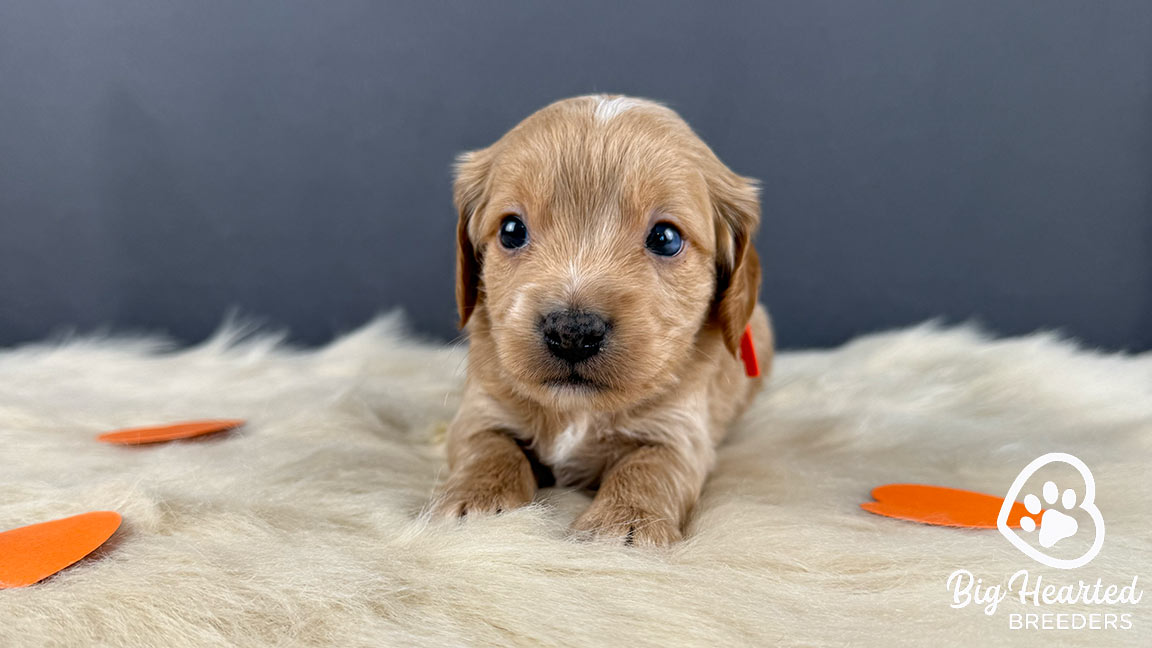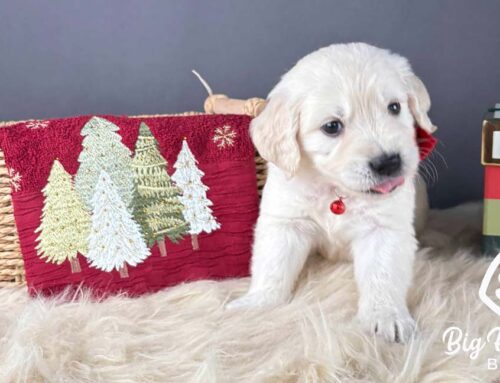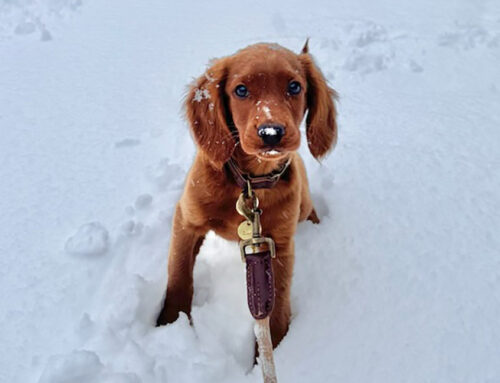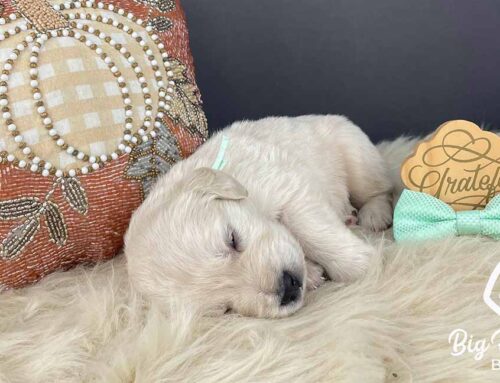Potty Training 101: Complete Guide for Mini Golden Retrievers
- Understanding Mini Golden Retriever Potty Needs
- Setting the Stage for Potty Training Success
- Crate Training: Our Go-To Method
- Daily Potty Training Schedule
- Real-Life Success: Luna’s First Week
- Positive Reinforcement Is Everything
- When Standard Approaches Don’t Work: Max’s Story
- Training Two Puppies: Bella & Cooper
- Troubleshooting Common Issues
- When to Call the Vet
- Bonus Tip: Our Puppy Training Packages
- Final Thoughts: Your Puppy Can Do This, And So Can You
- Frequently Asked Questions About Potty Training
Potty Training 101: Complete Guide for Mini Golden Retrievers
Bringing home a mini Golden Retriever puppy is exciting, but potty training can feel overwhelming. At Big Hearted Breeders, we believe in setting both puppies and families up for success. This guide shares our proven potty training methods based on years of experience raising well-socialized, happy pups.
We’ve also developed customized puppy training packages designed to make this process smoother, offering support for everything from basic manners to crate and house training using gentle, effective methods.
Understanding Mini Golden Retriever Potty Needs
Mini golden retrievers are intelligent, eager-to-please dogs, but their smaller size means smaller bladders. Expect potty breaks every 1–2 hours during the early weeks, especially when your pup is under 4 months old. Most puppies gain reliable bladder control between 4 and 6 months, with nighttime control developing slightly later.
Every puppy is different, so stay patient and consistent. Remember: potty training is developmental, not instant.
Setting the Stage for Potty Training Success
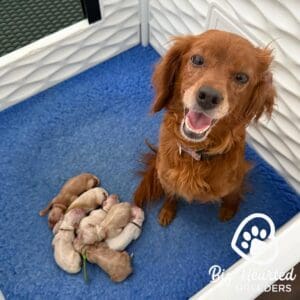
Your Environment Matters
Designate consistent bathroom spots both inside (if using pads) and outside. If outdoors, choose a quiet, distraction-free area. Indoors, limit access to carpeted spaces and use baby gates to manage where your pup can roam.
Essential Supplies
- Crate (appropriately sized)
- High-value treats (we recommend pawTree’s delicious and all-natural treats)
- Enzymatic cleaner (for messes)
- Leash and collar
- Weather-appropriate gear
These basics support structure, reward success, and handle the inevitable accidents with grace.
Crate Training: Our Go-To Method
Why It Works
Crate training works because dogs instinctively avoid soiling their sleeping area. With the proper setup and positive reinforcement, crate training becomes a safe and effective way to support potty habits.
Setting Up
Use a crate that’s just big enough for standing, turning, and lying down. Too large, and your pup might potty in one end and sleep in the other. Keep the crate in a quiet but family-centered space and make it inviting with bedding and a toy.
Feed meals in the crate, never use it as punishment, and always pair crate time with plenty of potty opportunities, especially after sleep, play, or meals.
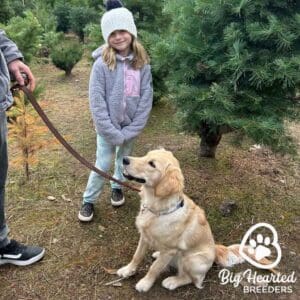
Daily Potty Training Schedule
Puppies thrive on routine. For an 8–12 week old, follow this g
eneral potty training schedule:
- 6:00 AM – Wake & potty
- 6:15 AM – Breakfast + potty
- Every 1–2 hours – Potty breaks
- After meals, naps, and play – Always potty
- 10:00 PM – Final break before bed
- Overnight – 1–2 short potty trips (gradually reduce)
Adjust for weather and distractions, but maintain consistency as much as possible.
Real-Life Success: Luna’s First Week
The Johnsons brought home Luna, their first puppy, and were overwhelmed after several accidents on the first day. With our support, they implemented a structured potty schedule and stuck with it. By day five, Luna was signaling at the door, and by week’s end, she’d gone two days accident-free.
The key? Consistency, patience, and rewarding even the smallest victories.
Positive Reinforcement Is Everything

Why It Works
Mini golden retrievers respond best to love and encouragement, not fear. Reward success immediately after your puppy eliminates in the correct spot. Use:
- Happy verbal praise
- A small treat
- Gentle petting
- A quick play session
Timing Matters
Deliver the reward within seconds of the behavior. This strengthens the connection between pottying outside and good things happening.
When Standard Approaches Don’t Work: Max’s Story
Max, a headstrong puppy, would ask to go outside, but then have accidents inside right after. We discovered he was overstimulated outdoors. The solution? Leashing him directly to the potty spot with no distractions until the job was done.
With that change, Max began to focus, and potty training turned a corner. Within a week, he was accident-free.
Lesson: Adapt your approach to your puppy’s personality.
Training Two Puppies: Bella & Cooper
The Martinez family adopted littermates, Bella and Cooper. Bella learned quickly. Cooper took his time until he saw Bella earning praise and treats. Soon, he followed suit, and both pups were reliably potty trained by the end of the first month.
In multi-puppy homes, training can be more work, but peer learning can accelerate success when done right.
Troubleshooting Common Issues
Regression
Even well-trained pups can regress during changes, like travel, new family members, or schedule shifts. If that happens, return to basics: increase supervision and frequency of breaks.
Distractions
Playful puppies may ignore potty cues. Schedule breaks during exciting moments like playdates and reinforce potty time with rewards.
Weather Challenges
Set up covered outdoor areas or indoor backups like turf pads during extreme conditions. Don’t let the weather derail your progress.
When to Call the Vet
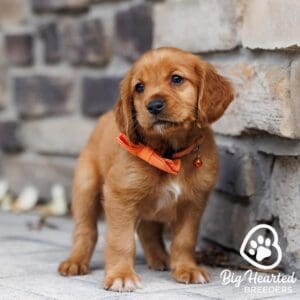 Frequent accidents despite a good schedule may signal health issues like:
Frequent accidents despite a good schedule may signal health issues like:
- Urinary tract infections
- Parasites
- Digestive problems
Signs to watch for:
- Straining or pain during elimination
- Blood in urine or stool
- Persistent diarrhea or constipation
- Sudden accidents after steady success
If anything seems off, consult your vet. At Big Hearted Breeders, our puppies come with health guarantees and early vet care to support lifelong wellness.
Bonus Tip: Our Puppy Training Packages
Want extra support with potty training? Our puppy training packages are designed to help with crate training, house training, leash skills, and more, offered in progressive phases based on your puppy’s age. Whether your puppy needs to build confidence or reinforce core behaviors, we’ll help guide the process with positive reinforcement and expert care.
Final Thoughts: Your Puppy Can Do This, And So Can You
Potty training is a journey, not a race. It takes time, consistency, and a whole lot of treats. Your mini golden retriever is smart, willing, and more than capable of learning where and when to go potty. The most important thing? Celebrate progress and stay consistent.
You’ve got this, and we’ve got your back every step of the way.
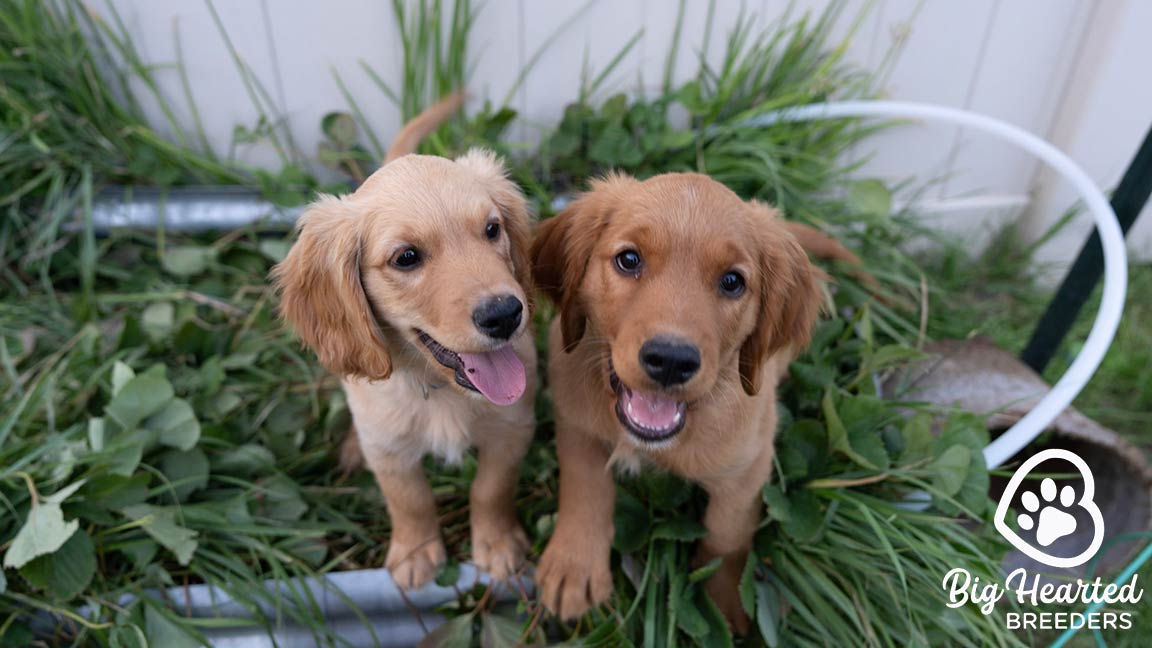
Frequently Asked Questions About Potty Training
How long does potty training take?
Most puppies gain daytime control by 4–6 months. Nighttime may take longer. Every pup is different.
Is it normal for my puppy to have nighttime accidents?
Yes, mainly before 4 months. Limit water before bed and take it out once or twice overnight at first.
Can I use puppy pads?
Only if necessary. They can confuse your puppy about indoor vs. outdoor potty habits. If used, transition outdoors as soon as possible.
What if my puppy has frequent accidents?
Increase break frequency and supervision. Rule out medical issues. Stick to your routine.
How do I clean accidents properly?
Use an enzymatic cleaner, never ammonia. It removes odor and discourages repeat accidents.
How do I know my puppy is ready for more freedom in the house?
When they consistently go several days accident-free and signal when they need to go, you can begin slowly expanding access.
What if my puppy is afraid to go outside?
Make outside time fun and pressure-free. Use treats, toys, and encouragement—never force it.
When should I call the vet?
If your puppy shows signs of pain, unusual frequency, blood, or sudden regression, seek veterinary care immediately.

